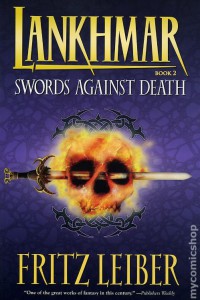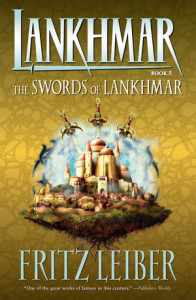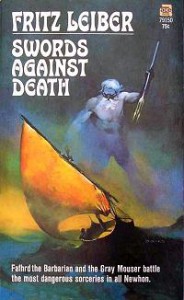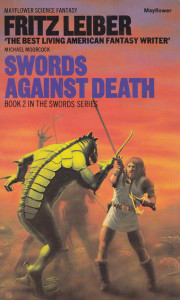Swords Against Death Re-Read: “The Seven Black Priests”
 Bill Ward and I are re-reading a book from Fritz Leiber’s famous Lankhmar series, Swords Against Death. We hope you’ll pick up a copy and join us. This week we tackled the seventh tale in the volume, “The Seven Black Priests.”
Bill Ward and I are re-reading a book from Fritz Leiber’s famous Lankhmar series, Swords Against Death. We hope you’ll pick up a copy and join us. This week we tackled the seventh tale in the volume, “The Seven Black Priests.”
 Howard: This is one of my very favorite Fafhrd and Gray Mouser tales, so much so that I even had some key lines memorized despite not having read it in more than twenty-five years. I never forgot Fafhrd’s dismissive comment about their first attacker being a “mad hermit, frost-bitten black” or much of the verse he was composing, to be completed while dangling over a bottomless abyss.
Howard: This is one of my very favorite Fafhrd and Gray Mouser tales, so much so that I even had some key lines memorized despite not having read it in more than twenty-five years. I never forgot Fafhrd’s dismissive comment about their first attacker being a “mad hermit, frost-bitten black” or much of the verse he was composing, to be completed while dangling over a bottomless abyss.
Here we see the good natured pair at their very best as they wander the snowy wastes on their way back to Lankhmar. One by one the seven (or is it eight?) black priests attack them, first for daring to invade their territory, and then for stealing the eye of their “strange and improbable god.”
And it’s just beautifully done. From the almost Wiley E. Coyote like attack plans, to the growing menace of the god and its eye, to the dialogue, to the fantastic battle scenes, it remains one of the most well conceived short stories in the entire sword-and-sorcery canon. There are so many moments of fine dialogue! My favorites might well be the various exchanges concerning the exact number of priests, the aforementioned “frostbitten” dismissal, or this one, once Fafhrd and the Mouser have stolen the eye and are pursued by the priests:
 “I think they’re unreasonably angry,” Fafhrd asserted, scrambling to his feet.
“I think they’re unreasonably angry,” Fafhrd asserted, scrambling to his feet.
“Priests always are,” the Mouser said philosophically, with a sidewise shudder at the dart’s black crusted point.
My favorite moment is either the description of the priests as they scramble to roll a giant snowball down on our heroes, or the fantastic sword fight upon the ice, which has few equals in heroic fantasy fiction.
Bill: The banter in this one is stand-out stuff, even among a body of consistently excellent and well-crafted tales as these. The one that had me was Fafhrd’s “I shot the second avalanche aside,” and the Mouser exalting how they would brag to the thieves of Lankhmar that they “not only crossed the Bones of the Old Ones, but picked them on the way.” Lots of these bantering moments, plus a general lightness of tone and language keeps this story feeling like a romp even, though not incongruously so, at the very end when Fafhrd is (once again) possessed and faces a more dangerous foe than the priests.
 Howard: Oh, yeah, the avalanche bit was great, and I smiled at the bones comment myself.
Howard: Oh, yeah, the avalanche bit was great, and I smiled at the bones comment myself.
As far as peering behind the curtain on this one, I noticed that Leiber dispensed with some of the earlier conceits – for instance, the moment the Mouser is introduced we know his name. Unlike some of the previous tales we didn’t first have to hear the name spoken by someone else before we got his point of view. I marveled at the skillful way Leiber showed us what both main characters looked like, in motion. We didn’t get a still portrait of them, but a few key bits of description as they trudged forward: the features a crouching priest might notice that were most distinctive about each one.
Bill: I didn’t notice that, good catch. I should probably go look up the dates that these tales were all written. Something tells me this had to have come fairly soon after the earlier stories in this book (which also reminds me, it was great to see the continuity with “The Sunken Land” in Fafhrd’s song and their predicament — this is a direct sequel to that story). So, maybe I’m completely wrong, but this story does feel like a step up for F&GM. They seem even stronger as characters and the tone of their adventures is more distinctive. So many of the elements of earlier stories are there, combing the more adventuresome aspects of “The Jewels in the Forest” with the weird tales sort of possession and supernatural plotlines of “The Bleak Shore” or “The Howling Tower” in probably the most satisfying mix yet. It’s a tight, smart, vivid, fun — it’s exactly the sort of story I think of when I think of Fafhrd and the Gray Mouser.
Howard: It really was fine with a capital F. Perhaps “Thieves’ House” was as good, but Leiber wasn’t quite as polished a writer then as he was when he drafted this one.
Even though I’ve read this book, and this particular tale multiple times, I never noticed a little coincidence that was probably deliberate until I plunked in the opening paragraph and updated it with this week’s title. It’s as though Leiber played a little joke on me years ago and I just now got it. The story of the seven black priests is the seventh story in the collection…
Next week, “Claws from the Night.”
7 Comments